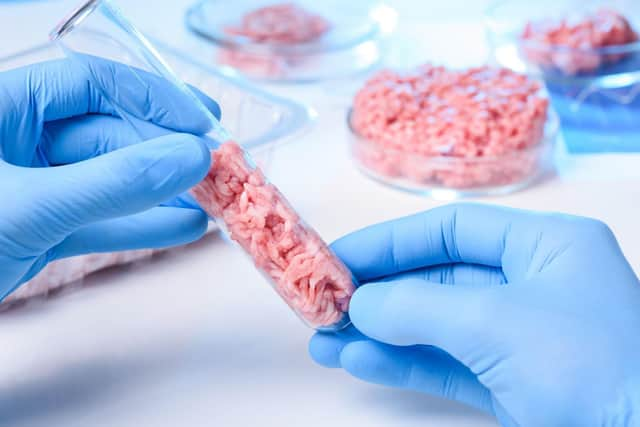Sustainable Scotland: Scots biotech firm is bringing home the bacon with lab-grown meat breakthroughs
Roslin Technologies – a spin-out from the University of Edinburgh with links to the institute that famously reared Dolly the Sheep, the world’s first cloned mammal – is a leader in the field of artificially cultivated meat.
Its chief has already revealed a personal goal to create lab-grown haggis by Burns Night next year.
Advertisement
Hide AdAdvertisement
Hide AdThe firm’s unique technology uses small samples of animal tissue to create “induced pluripotent stem cells” which self-renew and can be used to grow different types of tissue – such as muscle and fat.
It is the only commercial provider of these cells and supplies its pig cells and specially concocted growing medium to producers of cultivated meat across the world.
Now the team, based on the outskirts of Edinburgh, has made a breakthrough that will bring plans to mass-produce eco-friendly no-slaughter meat a step closer.
Their pioneering new methods can ensure the consistency of tank-grown pork products and reduce the costs involved in producing them, which could help speed up development of the emerging industry in the UK.


Although still in its infancy, the global market for lab-grown meat has been forecast to reach £21.2 billion by 2030.
“The project outputs are a big step towards using our cells and media for the production of cultivated meat at scale,” said Dr Karen Fairlie-Clarke, innovation and engagement manager for Roslin Technologies.
“The proof of concept has shown that costs can be reduced, batch to batch variation reduced, and now, in partnership with cultivated meat producers, we can take the findings forward to larger bioreactors and begin the process of scaling up to industry standards.”
Livestock farming has increasingly come under fire in recent years for three key reasons: environmental impacts such as deforestation, methane emissions, pollution and high water usage; animal welfare issues; and use of chemicals and medications.
Advertisement
Hide AdAdvertisement
Hide AdMan-made meat is expected to play a key part in decarbonisation of the global food production system while helping meet the protein needs of a rapidly growing population without the need to raise animals for slaughter.
The world’s first lab-grown beefburger was served up in 2013, but it took two years to create and had a whopper price tag at $300,000.
But innovation in the sector has taken giant leaps forward since then and products are already on sale to consumers in Singapore.
It’s hoped the UK can reach this point within the next few years.
Dr Liz Fletcher is director of business engagement and operations at Scotland’s Industrial Biotechnology Innovation Centre (IBioIC), which has provided funding for the project.
“Making fundamental changes to the way we produce and consume food will be a critical part of how we make the sector more sustainable and feed the world’s growing population,” she said.
“It is highly encouraging that research taking place in Scotland is at the vanguard of developing solutions to that challenge, potentially creating a more efficient sector that does not rely on raising animals.”
Comments
Want to join the conversation? Please or to comment on this article.
